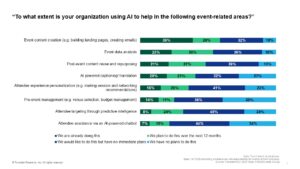AI In Events: A Promise Waiting To Be Realized
AI has the potential to fundamentally remake many aspects of how we plan and execute events. Yet despite its wide-ranging potential, data from Forrester’s Q1 2025 State Of B2B Events Survey shows that current uptake is low. While some leaders we spoke with are cautiously optimistic, there are wide-ranging concerns around safety, privacy, and vendor capabilities. One event leader encapsulated the current sentiment: “Right now, AI is more of a promise than a reality.”

Analysis of the survey data provided the following insights:
Content creation leads the way.
Among organizations that are experimenting with AI, event content creation is the most common use case. Thirty-nine percent of survey respondents report that they use AI for tasks such as building event landing pages and writing emails, while 21% currently leverage AI to repurpose content post-event. Even within this simple use case, uptake varies significantly. Forty-seven percent of midsized organizations are currently using AI for content creation, as compared to 29% of the largest enterprises, while just 19% of organizations in the financial services sector make use of AI here compared to 40% of high-tech and telecommunications companies.
There is low uptake (but high interest) in using AI to improve the attendee experience.
The current uptake of AI to improve the attendee experience through better targeting, increased personalization, and improved assistance is very low, with only 7–15% of organizations making use of AI for these three use cases. Leaders we spoke with were more focused on exploring AI to drive productivity and efficiency improvements and expressed nervousness with AI that directly touches attendees. That said, leaders see massive opportunity here, with more than 40% of respondents telling us that “We would like to do this but have no immediate plans” — a higher percentage saying so than for any other use case.
High spenders lead the AI charge.
Organizations with larger event technology budgets are more likely to have already embraced AI and are exploring more advanced use cases, or plan to do so in the next 12 months. Among those spending over $250,000 annually on event technology, 68% use (or plan to use) AI for data analysis as compared to 39% of low event-tech spenders. They are also more likely to be using or planning to use AI that directly impacts attendees, while low tech spenders are more focused on using AI for simple content creation, with 55% prioritizing AI for content creation. Conversations with enterprise event tech leaders revealed dissatisfaction with overstated vendor AI claims, leading the most advanced organizations to develop their own AI capabilities.
Younger marketers show growing interest.
Younger marketers from the Gen Z and Millennial cohorts are showing greater enthusiasm for AI’s potential, particularly in areas such as attendee assistance via AI-powered chatbots, predictive intelligence for targeting, and attendee experience personalization. Their interest has yet to translate into action, however, as older generations mostly control adoption plans over the next year.
The Road Ahead
Despite its slow uptake, AI’s promise in event management is undeniable. Some trailblazers we spoke with are experimenting with cutting-edge applications such as facial recognition to understand attendee sentiment. As organizations grow more comfortable with AI and its capabilities evolve, the technology will play a transformative role in B2B events, helping marketers deliver smarter, more personalized, and impactful experiences. For now, AI remains a promise — but event teams need to act quickly or risk getting left behind.
If you are a Forrester client, you can reach out to schedule a guidance session to dive deeper into this topic and explore how to best utilize AI to maximize the value of your event program.
